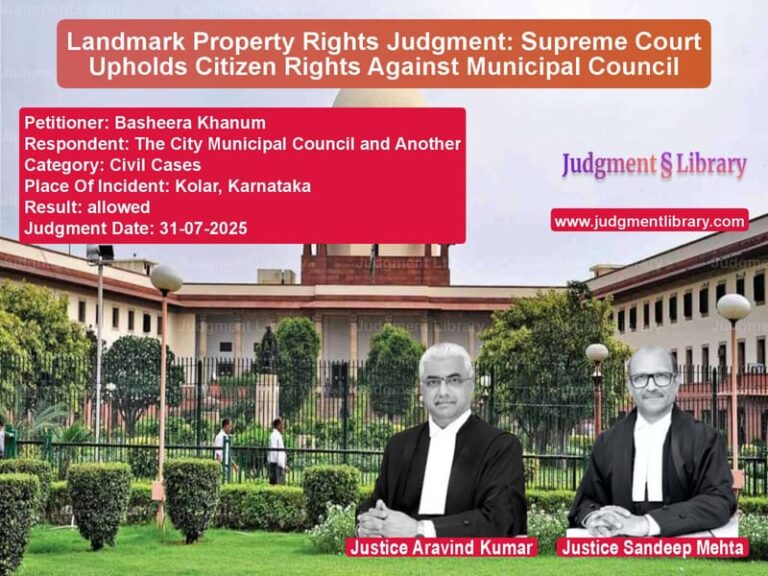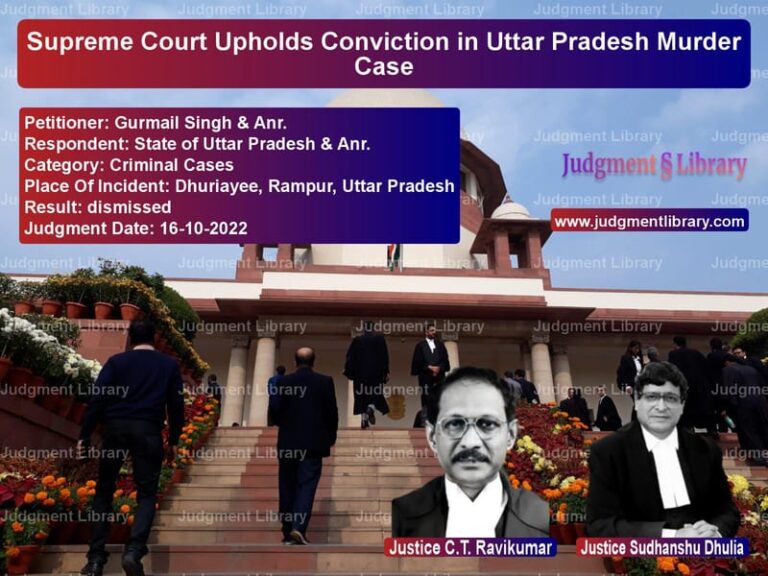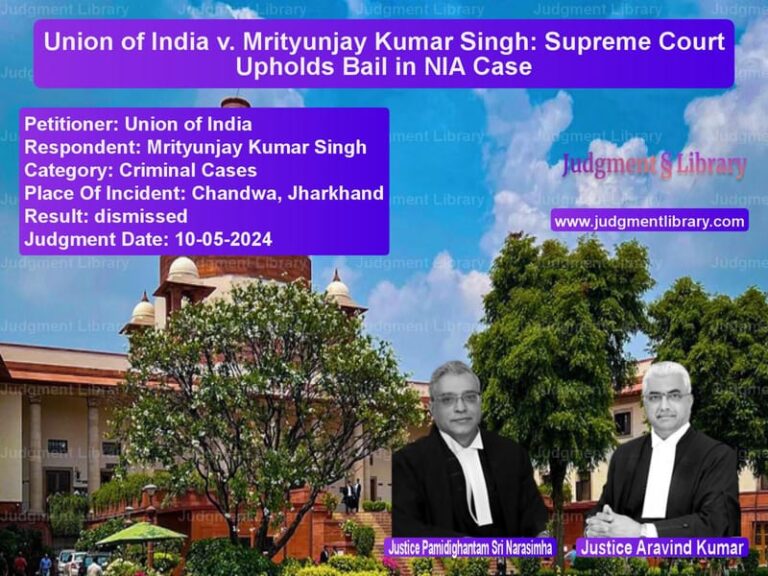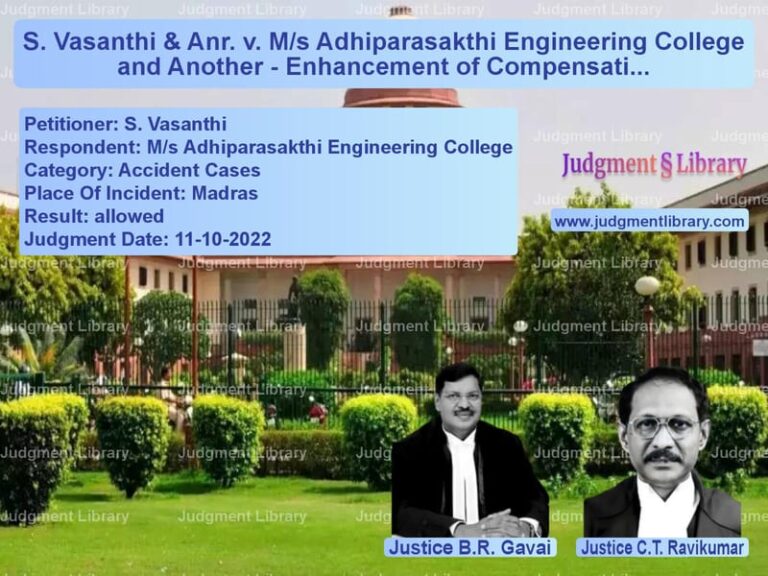DJ Sound Ban Overturned: Supreme Court Rules on Noise Pollution Regulations
The Supreme Court’s ruling in Sachin Kashyap & Ors. vs. Sushil Chandra Srivastava & Ors. has clarified the legal boundaries of judicial overreach in noise pollution cases. The case arose from a judgment by the Allahabad High Court, which imposed a blanket ban on DJs, citing noise pollution concerns, even though the issue was not raised in the original writ petition.
The Supreme Court quashed the High Court’s directive, holding that courts cannot issue broad policy directions affecting fundamental rights without proper pleadings or affected parties being heard. This decision has far-reaching implications for entertainment businesses, religious functions, and weddings where DJs are commonly used.
Background of the Case
The case originated from a writ petition filed in the Allahabad High Court by respondents Sushil Chandra Srivastava & Ors., seeking the removal of a large LCD screen installed at Hashimpur Chauraha, Prayagraj. The petitioners argued that the screen caused inconvenience and public nuisance.
However, while ruling on the petition, the High Court extended its scope to include noise pollution and issued a blanket prohibition against the use of DJ systems in public places. The High Court reasoned:
“No permission for DJ shall be granted by the authority as the noise generated is unpleasant and exceeds permissible limits. DJs pose a serious threat to human health, particularly to children, senior citizens, and hospital patients.”
This ruling was challenged in the Supreme Court by Sachin Kashyap & Ors., who argued that their livelihood as DJs was being affected without due process.
Key Legal Issues
- Did the High Court exceed its jurisdiction by banning DJs when the writ petition only pertained to an LCD screen?
- Was the fundamental right to livelihood under Article 19(1)(g) of the Constitution violated by the blanket ban?
- Should affected parties have been heard before imposing restrictions?
- Was the restriction on DJs lawful under the Noise Pollution (Regulation and Control) Rules, 2000?
Petitioners’ Arguments
The petitioners, represented by their legal counsel, argued:
- The High Court’s order was ultra vires since the issue of DJs was never raised in the original writ petition.
- They had a constitutional right to practice their profession under Article 19(1)(g).
- Noise pollution laws already regulated DJ usage, and a blanket ban was disproportionate.
- The ruling caused financial harm to DJs, who depend on playing music at weddings, religious events, and public functions.
Respondents’ Arguments
The respondents, including the original writ petitioners and state authorities, defended the High Court’s directive:
- Courts have broad powers under Article 226 of the Constitution to pass necessary orders for public welfare.
- Noise pollution from DJs was a well-known issue, and the ban was justified to protect citizens’ health.
- The directive aligned with existing laws that regulate noise levels.
Supreme Court’s Observations and Judgment
High Court’s Overreach
The Supreme Court criticized the High Court for issuing a directive on an issue not raised in the original petition. It held:
“The writ petition was filed solely for the removal of an LCD screen. There were neither pleadings nor any prayer concerning DJs or noise pollution. The High Court’s expansion of the petition’s scope was beyond its jurisdiction.”
Right to Livelihood
The Court emphasized that the blanket ban on DJs violated the fundamental right to livelihood:
“The right to practice any profession or to carry on any occupation, trade, or business is a constitutional guarantee. DJs provide employment to thousands. Any restriction must be reasonable and follow due process.”
Existing Noise Regulations
The Court noted that noise pollution laws already existed under the Noise Pollution (Regulation and Control) Rules, 2000, and there was no need for an additional ban:
“Noise control must be implemented under statutory frameworks. A complete prohibition is excessive and disproportionate.”
Violation of Natural Justice
The Supreme Court ruled that affected parties, such as DJs and event organizers, should have been heard before imposing restrictions:
“Prior to passing such an order of public importance, the affected parties should have been impleaded, at least in a representative capacity.”
Final Ruling
The Supreme Court quashed the High Court’s directive banning DJs and held that DJs may operate only in accordance with noise pollution regulations and after obtaining the necessary licenses.
Key Takeaways from the Judgment
- Courts cannot expand writ petitions beyond their original scope.
- Fundamental rights, such as livelihood, must be protected from arbitrary judicial actions.
- Noise pollution must be regulated but not through blanket bans.
- Due process and natural justice require affected parties to be heard before imposing restrictions.
Conclusion
The Supreme Court’s decision in this case reinforces constitutional safeguards against judicial overreach. It ensures that noise pollution concerns are addressed through appropriate regulatory mechanisms rather than outright prohibitions that harm livelihoods.
With this ruling, DJs and event organizers can continue their work, provided they comply with noise pollution regulations. The judgment balances the need for environmental protection with economic and cultural realities, setting a precedent for future cases involving similar restrictions.
Petitioner Name: Sachin Kashyap & Ors..Respondent Name: Sushil Chandra Srivastava & Ors..Judgment By: Justice Vineet Saran, Justice Dinesh Maheshwari.Place Of Incident: Prayagraj, Uttar Pradesh.Judgment Date: 15-07-2021.
Don’t miss out on the full details! Download the complete judgment in PDF format below and gain valuable insights instantly!
Download Judgment: sachin-kashyap-&-ors-vs-sushil-chandra-sriva-supreme-court-of-india-judgment-dated-15-07-2021.pdf
Directly Download Judgment: Directly download this Judgment
See all petitions in Consumer Rights
See all petitions in Public Interest Litigation
See all petitions in Contract Disputes
See all petitions in Legal Malpractice
See all petitions in Other Cases
See all petitions in Judgment by Vineet Saran
See all petitions in Judgment by Dinesh Maheshwari
See all petitions in allowed
See all petitions in Quashed
See all petitions in supreme court of India judgments July 2021
See all petitions in 2021 judgments
See all posts in Civil Cases Category
See all allowed petitions in Civil Cases Category
See all Dismissed petitions in Civil Cases Category
See all partially allowed petitions in Civil Cases Category







